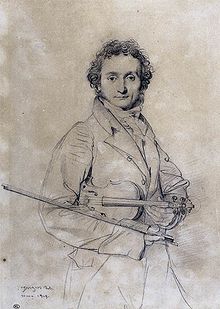Niccolò Paganini
Visiting Professor, Violin

- Title Visiting Professor, Violin
- Office 173 Bay State Road
- Email paganini@bu.edu
- Phone 617-353-3270
Italian violinist, violist, cellist, guitarist, and composer. He was one of the most celebrated violin virtuosi of his time, and left his mark as one of the pillars of modern violin technique. His caprice in A minor, Op. 1 No. 24 is among his best known compositions, and serves as inspiration for other prominent artists from Johannes Brahms to Sergei Rachmaninoff.
Niccolò Paganini was born in Genoa, Italy, the third of the six children of Antonio and Teresa (neé Bocciardo) Paganini. Paganini’s father was an unsuccessful trader, but he managed to supplement his income through playing music on the mandolin. At the age of five, Paganini started learning the mandolin from his father, and moved to the violin by the age of seven. His musical talents were quickly recognized, earning him numerous scholarships for violin lessons.
The young Paganini studied under various local violinists, including Giovanni Servetto and Giacomo Costa, but his progress quickly outpaced their abilities. Paganini and his father then traveled to Parma to seek further guidance from Alessandro Rolla. But upon listening to Paganini’s playing, Rolla immediately referred him to his own teacher, Ferdinando Paër and, later, Paër’s own teacher, Gasparo Ghiretti. Though Paganini did not stay long with Paër or Ghiretti, the two had considerable influence on his composition style.
By age 18, Paganini was appointed first violin of the Republic of Lucca, but a substantial portion of his income came from freelancing. His fame as a violinist was matched only by his reputation as a gambler and womanizer. In 1805, Lucca was annexed by Napoleonic France, and the region was ceded to Napoleon’s sister, Elisa Baciocchi. Paganini became a violinist for the Baciocchi court, while giving private lessons for her husband, Félix. In 1807, Baciocchi became the Grand Duchess of Tuscany and her court was transferred to Florence. Paganini was part of the entourage, but, towards the end of 1809, he left Baciocchi to resume his freelance career.